| Listing 1 - 10 of 13 | << page >> |
Sort by
|
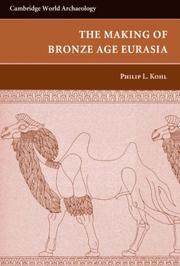
ISBN: 9780521847803 052184780X 9780511618468 9780521130158 9780511270048 0511270046 051126948X 9780511269486 0511618468 1107164532 9781107164536 1280750391 9781280750397 0511268238 9780511268236 0511320299 9780511320293 0511268904 9780511268908 0521130158 Year: 2007 Volume: *16 Publisher: Cambridge, UK New York Cambridge University Press
Abstract | Keywords | Export | Availability | Bookmark
 Loading...
Loading...Choose an application
- Reference Manager
- EndNote
- RefWorks (Direct export to RefWorks)
This book provides an overview of Bronze Age societies of Western Eurasia through an investigation of the archaeological record. The Making of Bronze Age Eurasia outlines the long-term processes and patterns of interaction that link these groups together in a shared historical trajectory of development. Interactions took the form of the exchange of raw materials and finished goods, the spread and sharing of technologies, and the movements of peoples from one region to another. Kohl reconstructs economic activities from subsistence practices to the production and exchange of metals and other materials. Kohl also argues forcefully that the main task of the archaeologist should be to write culture-history on a spatially and temporally grand scale in an effort to detect large, macrohistorical processes of interaction and shared development.
Bronze age --- Excavations (Archaeology) --- Eurasia --- Antiquities --- Antiquities. --- Civilization --- Social Sciences --- Archeology --- Bronze age - Eurasia --- Excavations (Archaeology) - Eurasia --- Eurasia - Antiquities
Book
Year: 1992
Abstract | Keywords | Export | Availability | Bookmark
 Loading...
Loading...Choose an application
- Reference Manager
- EndNote
- RefWorks (Direct export to RefWorks)
Digital
ISBN: 9780511618468 Year: 2007 Publisher: Cambridge Cambridge University Press
Abstract | Keywords | Export | Availability | Bookmark
 Loading...
Loading...Choose an application
- Reference Manager
- EndNote
- RefWorks (Direct export to RefWorks)
Bronze age --- Eurasia
Book
Year: 1979 Publisher: Ann Arbor (Mich.) : University microfilms international,
Abstract | Keywords | Export | Availability | Bookmark
 Loading...
Loading...Choose an application
- Reference Manager
- EndNote
- RefWorks (Direct export to RefWorks)
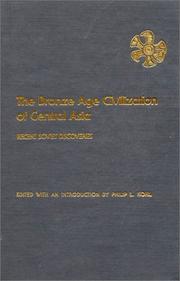
ISBN: 0873321693 Year: 1981 Publisher: Armonk (N.Y.) : Sharpe,
Abstract | Keywords | Export | Availability | Bookmark
 Loading...
Loading...Choose an application
- Reference Manager
- EndNote
- RefWorks (Direct export to RefWorks)
Bronze age --- -Excavations (Archaeology) --- -Civilization --- Asia, Central --- Antiquities. --- Excavations (Archaeology) --- -Asia, Central --- Civilization
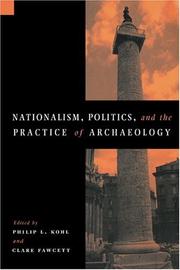
ISBN: 0521558395 9780251558396 0521480655 051155821X 9780521558396 9780511558214 9780521480659 Year: 1995 Publisher: Cambridge Cambridge University Press
Abstract | Keywords | Export | Availability | Bookmark
 Loading...
Loading...Choose an application
- Reference Manager
- EndNote
- RefWorks (Direct export to RefWorks)
Archaeology has often been put to political use, particularly by nationalists. The case studies in this timely collection range from the propaganda purposes served by archaeology in the Nazi state, through the complex interplay of official dogma and academic prehistory in the former Soviet Union, to lesser-known instances of ideological archaeology in other European countries, in China, Japan, Korea and the Near East. The introductory and concluding chapters draw out some of the common threads in these experiences, and argue that archaeologists need to be more sophisticated about the use and abuse of their studies. The editors have brought together a distinguished international group of scholars. Whilst archaeologists will find that this book raises cogent questions about their own work, these problems also go beyond archaeology to implicate history and anthropology more generally.
Archaeology --- Nationalism --- Archéologie --- Nationalisme --- Philosophy --- Political aspects --- Philosophie --- Aspect politique --- Archaeology and state. --- Political aspects. --- History --- Social Sciences --- Archeology --- Archaeology - Political aspects. --- Nationalism - History - 20th century. --- Anthropology --- Auxiliary sciences of history --- Antiquities --- Public archaeology --- State and archaeology
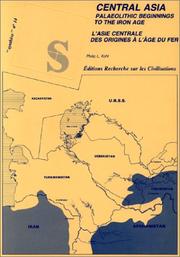
ISBN: 2865380718 9782865380718 Year: 1984 Volume: 14 Publisher: Paris Editions Recherche sur les civilisations
Abstract | Keywords | Export | Availability | Bookmark
 Loading...
Loading...Choose an application
- Reference Manager
- EndNote
- RefWorks (Direct export to RefWorks)
Prehistoric peoples --- Asia, Central --- Antiquities --- Prehistoric peoples - Asia, Central --- Asia, Central - Antiquities
Book
ISBN: 0816539251 081659855X 0816531129 1322182841 9780816598557 Year: 2014 Publisher: University of Arizona Press
Abstract | Keywords | Export | Availability | Bookmark
 Loading...
Loading...Choose an application
- Reference Manager
- EndNote
- RefWorks (Direct export to RefWorks)
"Nature and Antiquities analyzes how the study of indigenous peoples was linked to the study of nature and natural sciences. Leading scholars break new ground and entreat archaeologists to acknowledge the importance of ways of knowing in the study of nature in the history of archaeology"-- "Nature and Antiquities examines the relation between the natural sciences, anthropology, and archaeology in the Americas in the nineteenth and early twentieth centuries. Taking the reader across the Americas from the Southern Cone to Canada, across the Andes, the Brazilian Amazon, Mesoamerica, and the United States, the book explores the early history of archaeology from a Pan-American perspective. The volume breaks new ground by entreating archaeologists to acknowledge the importance of ways of knowing that resulted from the study of nature in the history of archaeology. Some of the contributions to this volume trace the part conventions, practices, and concepts from natural history and the natural sciences played in the history and making of the discipline. Others set out to uncover, reassemble, or adjust our vision of collections that research historians of archaeology have disregarded or misrepresented--because their nineteenth-century makers would refuse to comply with today's disciplinary borders and study natural specimens and antiquities in conjunction, under the rubric of the territorial, the curious or the universal. Other contributions trace the sociopolitical implications of studying nature in conjunction with 'indigenous peoples' in the Americas--inquiring into what it meant and entailed to comprehend the inhabitants of the American continent in and through a state of nature"--
Archaeology --- Archeology --- Anthropology --- Auxiliary sciences of history --- History --- Antiquities --- SOCIAL SCIENCE / Ethnic Studies / Native American Studies. --- SOCIAL SCIENCE / Archaeology. --- America --- Indians --- Interdisciplinary approach to knowledge --- Natural history --- Archaeologists --- Antiquities. --- History. --- Historians --- History, Natural --- Natural science --- Physiophilosophy --- Biology --- Science --- Knowledge, Theory of --- Methodology --- Science and the humanities --- Human beings --- Antiquities, Prehistoric --- Indian antiquities --- Indian artifacts --- Primitive societies --- history of archaeology --- archaeological theory --- 19th century archaeology --- 20th century archaeology --- indigenous informant --- Social sciences
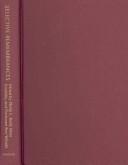
ISBN: 9780226450582 0226450589 9780226450599 0226450597 Year: 2007 Publisher: Chicago : University of Chicago Press,
Abstract | Keywords | Export | Availability | Bookmark
 Loading...
Loading...Choose an application
- Reference Manager
- EndNote
- RefWorks (Direct export to RefWorks)
When political geography changes, how do reorganized or newly formed states justify their rule and create a sense of shared history for their people? Often, the essays in 'Selective Remembrances 'reveal, they turn to archaeology, employing the field and its findings to develop nationalistic feelings and forge legitimate distinctive national identities. Examining such relatively new or reconfigured nation-states as Iran, Iraq, Turkey, Israel, Russia, Ukraine, India, and Thailand, 'Selective Remembrances' shows how states invoke the remote past to extol the glories of specific peoples or prove claims to ancestral homelands. Religion has long played a key role in such efforts, and the contributors take care to demonstrate the tendency of many people, including archaeologists themselves, to view the world through a religious lens& which can be exploited by new regimes to suppress objective study of the past and justify contemporary political actions. The wide geographic and intellectual range of the essays in 'Selective Remembrances' will make it a seminal text for archaeologists and historians.
Archaeology and state --- Archaeology --- Historiography --- Memory --- Nationalism --- Political aspects
Book
ISBN: 0521321077 Year: 1989 Publisher: Cambridge Cambridge University press
Abstract | Keywords | Export | Availability | Bookmark
 Loading...
Loading...Choose an application
- Reference Manager
- EndNote
- RefWorks (Direct export to RefWorks)
Iran --- Civilization --- Civilisation
| Listing 1 - 10 of 13 | << page >> |
Sort by
|

 Search
Search Feedback
Feedback About UniCat
About UniCat  Help
Help News
News